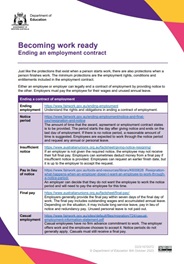
Resources
Becoming work ready
Resources to prepare young people to successfully engage in the world of work. This includes building promotional profiles, demonstrating skills and capabilities and transitioning into active participation in paid and unpaid work.


Topic: Career development
1. Developing a career portfolio
Find out what a career portfolio is and how to develop one.
2. Exploring career opportunities
Career exploration is an important stage of career building. It is important to use high quality and reliable sources of information that help set goals and influence decision making.
3. Career planning
Career planning reflects choices, decisions and transition points over a lifetime. Early career planning uses the knowledge of an individual’s skills, qualities, motivations, career and personal goals to create a plan.
4. Searching for a new job
Knowing how to automate job searches and safely pick out high quality jobs with preferred employers can help alleviate some of the stress related to finding a job.
5. Applying for a job
Applying for jobs can be daunting, particularly for a young person wanting to enter the world of work for the first time. Being informed about the recruitment process, people and technology can help a young person.
6. Starting a job
Job onboarding starts when a person has been offered a job through until they start work. Often a job offer is made after a job interview and reference checks have been completed. Job offers can be verbal or in writing.
7. First job performance expectations
After the employment contract has been accepted, job onboarding continues through to the first day of work until the end of the probation period.
8. Health, safety and wellbeing at work
Being provided with a safe working environment is an employment work right and legal obligation. Workplace laws cover aspects of health and safety.
9. Employment rights, pay and entitlements
Every worker needs to be aware of the employment laws that create their workplace rights, protections and obligations.
10. Financial management
Employers have an obligation to pay salary and wages to employees, as a minimum employment entitlement, for work that has been completed.

11. Ending an employment contract
There are protections for when a person finishes work. The minimum protections are the employment rights, conditions and entitlements included in the employment contract.
12. Contracting and starting a small business
Some workers may not be employees, but their own employer. They may work as a contractor, independent contractor, sub-contractor or as a sole trader.
School-based apprenticeships or traineeships
SBATs are paid, employment‑based training programs for full time school students, who are generally 15 years and older.